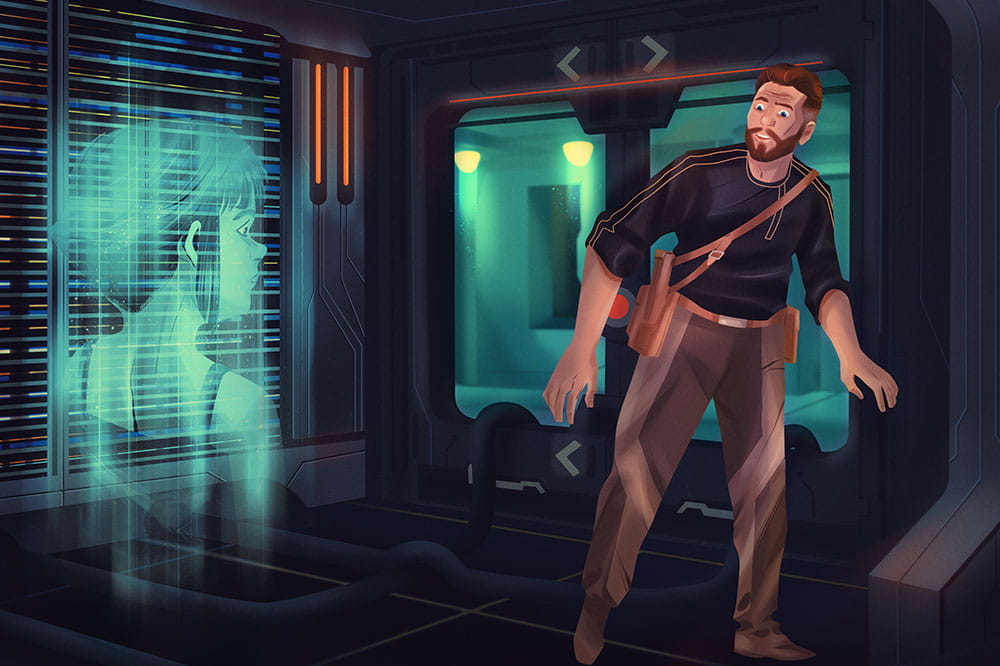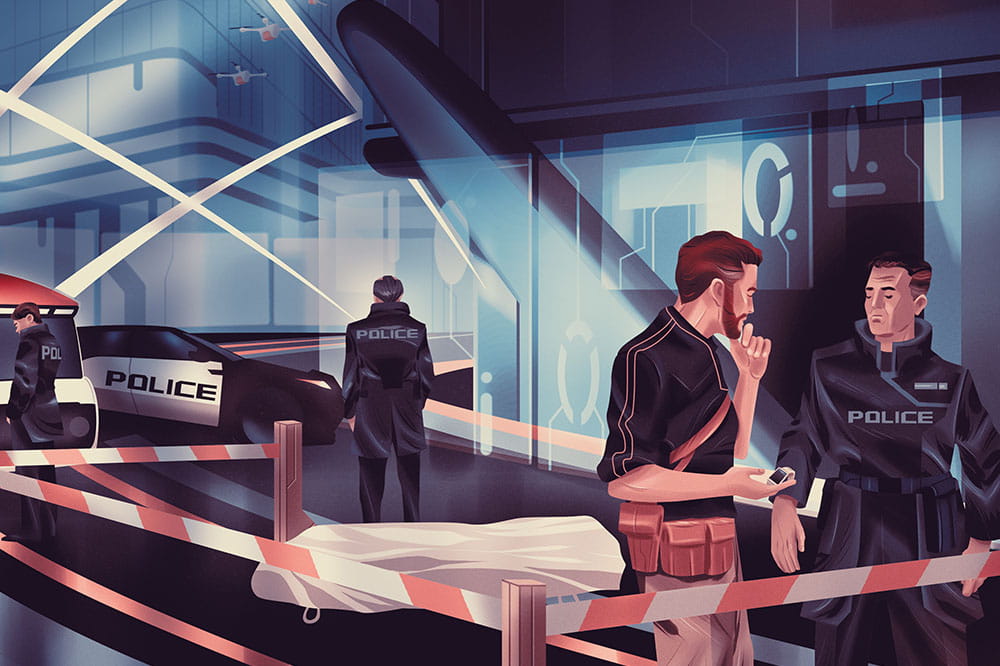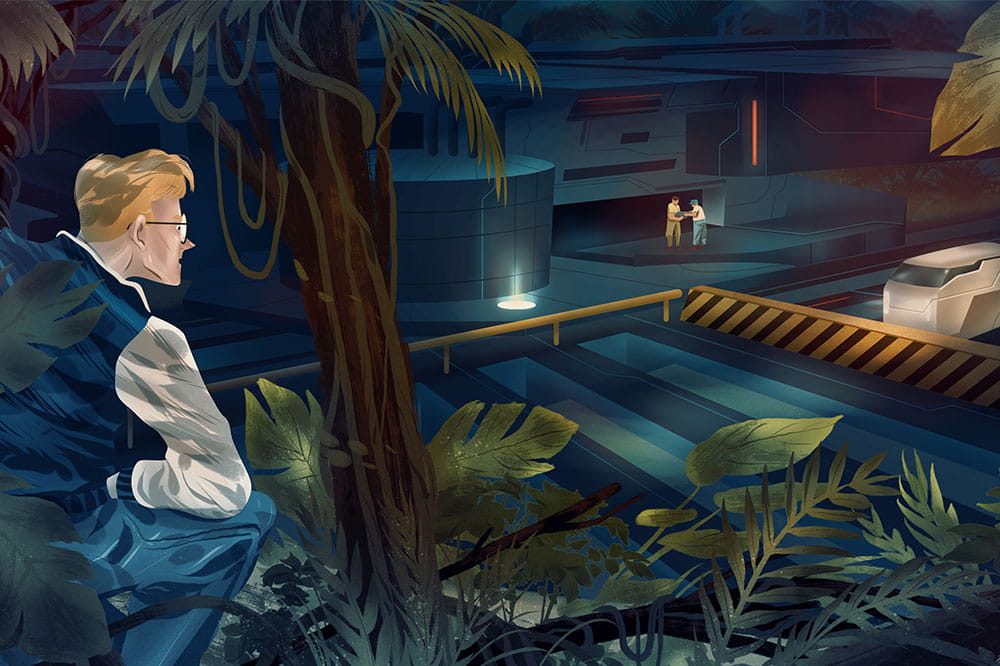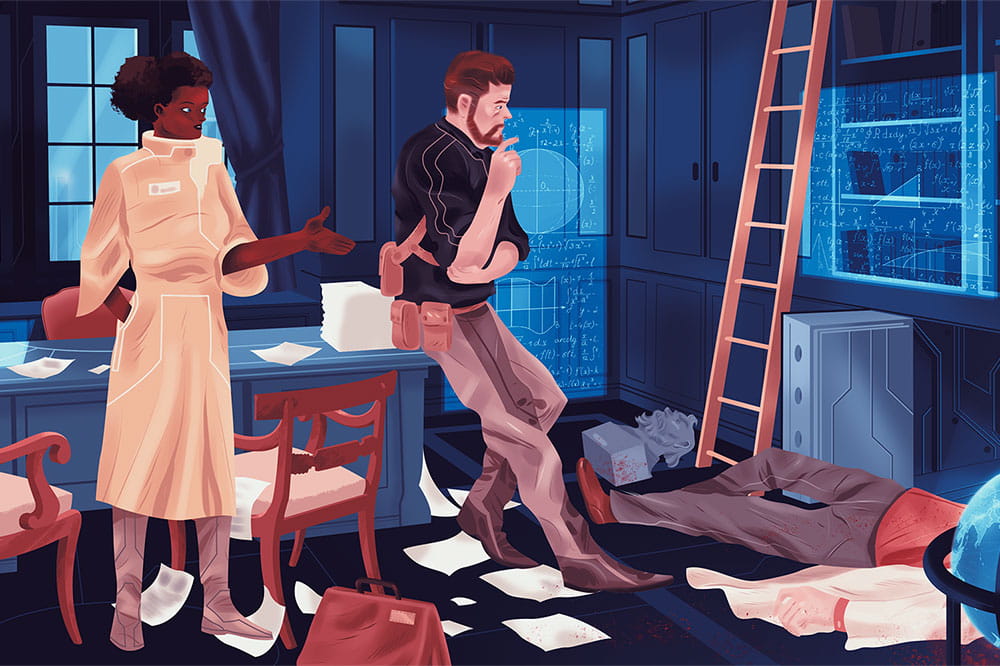Obtain news and background information about sealing technology, get in touch with innovative products – subscribe to the free e-mail newsletter.

TRAVELING INTO THE FUTURE
Each month, you can find a new chapter in the ESSENTIAL science-fiction series “Trip into the Future.” In a fictional world where the goals of the Paris climate accord have become a reality, Nero, a blogger, explores the potential technological and social transformation resulting from it. The goal of the series is to play with fully different visions as creatively as possible and to take the reader along on a thought experiment: What might our future look like – and why is it important to us?
Short Science Fiction Stories: Part 15
Looking Back, Looking Ahead
August 22, 2046. Nero, a tech blogger, decided to take stock. How far has humanity come in its battles against climate change, hunger and disease? What has changed in the energy industry, agriculture, mobility and medicine – and why?
The day started out differently. It was raining for the first time in weeks. As I sat at breakfast, I thought about my upcoming 50th birthday. My muesli didn’t taste very good. My AI assistant Avar tried to placate me, saying that the made-to-order mixture had automatically changed since my last medical checkup. It contained an avocado extract that was supposed to fight arteriosclerosis. The entire office routine seemed to have a calming effect on me. As always, my workday began with Avar reading the day’s chores to me. No appointments other than a relatively long phone call with one of the few clients who was not on summer vacation. Then Avar reviewed the material to follow up: “The oldest dates back to 2018. It refers to ‘human questions.’” I remembered the issues. Back then, the night before my twenty-second birthday, I wrote down a couple of questions that were designed to guide me in my journalistic work. My thesis at the time was that humanity would have solved all the basic problems in thirty years thanks to the progress of technology. I chuckle when I think of the optimistic young man that I once was. “Should I read the individual questions to you?” Avar asked. I spontaneously decide to change my schedule and to answer the questions from today’s standpoint.

Has humanity succeeded in stopping climate change?
Slowing it down, yes. Totally avoiding it, no. Hardly any environmentally harmful gases reach the air today. We no longer use the atmosphere as a garbage dump for the carbon dioxide that results from the burning of fossil materials such as oil, natural gas or coal. The entire energy sector has largely converted to electric current from renewable sources. Solar energy from the desert and wind energy from huge free-floating oceanic wind parks are distributed worldwide over high-voltage direct-current lines. This massive infrastructure is supplemented by local energy clusters, which don’t waste a single kilowatt hour. One example: The glass façades of skyscrapers in mega metropolises are micro powerplants that use solar radiation to air-condition their interiors.

Can climate-neutral mobility succeed?
Yes. The technical breakthrough for electric cars occurred in the 2020s – but only in Asia and Europe at the outset. A gigantic hydrogen industry emerged. After all it is even difficult to store electric energy directly today. Whenever high energy densities are needed to propel trucks, for example, hydrogen – generated with the help of green electricity – is used in fuel cells. Some of the hydrogen is further processed into high-quality, particularly energy-rich e-fuels. They resemble today’s gasoline and diesel but are not fossil fuels – the carbon dioxide that they require comes right from the air. Still, annual CO2 emissions continue to rise through 2030, the result of global economic growth. It is only in the last ten years that societies have succeeded in reducing emissions to a high degree. Since the carbon dioxide will remain in the atmosphere for a few thousand years, the global average temperature will presumably rise by up to 3° C. Research no longer focuses on climate-neutral technologies – instead, it deals with adaptations to the changes, which are now considered unavoidable.
Is there enough food and clean drinking water for all humanity?
Yes. Although 9.5 billion people now live on the planet and climate change has led to greater aridity in some regions, no one dies anymore from malnutrition or diseases caused by polluted drinking water. Digitalization has led to a green revolution. The yield per hectare has risen many times over. The secret: Human farmers are hardly involved in decisions on sowing, plant protection and irrigation. With the help of artificial intelligence, every individual square meter and every individual plant are nurtured to provide the best possible yield with the minimal use of resources. On the other hand, clean drinking water is mainly a question of energy use. Even thirty years ago, people were aware of a number of technologies that enabled drinking water to be extracted from seawater or bacterially-contaminated inland waters. Today the crucial difference is that these processes have become very, very affordable, as has the energy used in the processes.

Has medical care improved in significant ways?
Yes. There was finally a paradigm shift in medicine in the 2020s. Since then, the focus of physicians’ activities has no longer been the treatment of illnesses – it became the maintenance of health. Digitalization played a crucial role here as well: Individual health risks can be identified early with the help of artificial intelligence. Think of the smartphone as an individualized health manager in everyone’s pocket: It not only analyzes behavior – it continues to point out where people can improve. And if a therapy is still needed, micro-robots handle the largest share of them. They move through the individual’s bloodstream and bring active agents right where they are needed. Micro operations have been possible for a few years.
The result: Average ages have risen sharply in every region of the world. Children born in Africa today have the same life expectancy as those born in Europe.
What is the most important reason for success or failure in dealing with the major issues facing humankind?
It is not just rapid technological development that is responsible for the great progress that humanity has made in the first half of 21st century. More than anything else, it is education. The seventeen global goals that were set in 2015 under the auspices of the United Nations have spread far and wide. Every child becomes acquainted with these goals in primary school. Children no longer get less than ten years of schooling. Growing numbers of politicians and business leaders have geared their activities toward these goals. Not least of all, the systematic shift to sustainable business has paid off for industry.
For more than a year, Nero has explored the world of 2046 and has written his tech blog on behalf of Essential. This ends our science fiction series for now. But it may not be a final farewell. Here and in the world at large, the future is full of possibilities.
More Stories About Future Files

Join Us!
Experience Freudenberg Sealing Technologies, its products and service offerings in text and videos, network with colleagues and stakeholders, and make valuable business contacts.
Connect on LinkedIn! open_in_new









